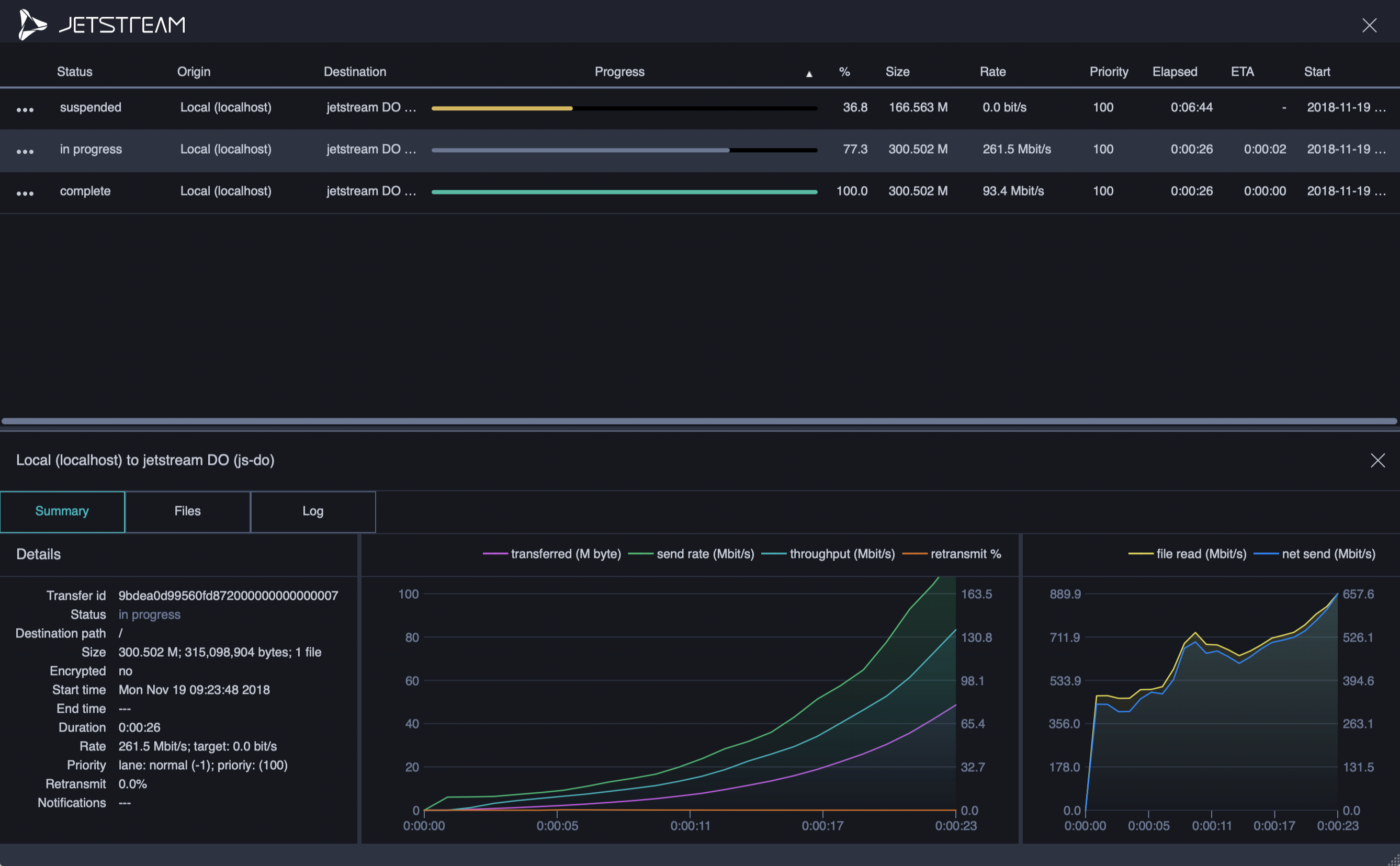Interacting with Jetstream¶
There are a few ways of working with Jetstream server: for automation, there are command line and Python API intefaces; for end users and convenient way of transferring files, there are graphical and command line clients.
Command Line Interface¶
Synopsis¶
jetstream [options] subcommand [subcommand-options]
Description¶
jetstream is the main way to interact with the Jetstream server. There are three sub commands:
- server to start the Jetstream server
- relay_server to start a relay server
- api to interact with API
jetstream server¶
Options¶
-
--api-hostarg¶ TCP client API host address. If specified, bind API to listen on this address (overrides
--api-allow-remote-control).
-
--api-portarg (=8886)¶ TCP client API control port.
-
--api-allow-remote-control¶ Allow API connections from remote machines (can be overriden by api-host).
-
--api-min-ssl-versionarg (=TLS1.2)¶ Minimum allowed SSL protocol (TLS1.2,TLS1.1,TLS1.0).
-
--api-ssl-certarg¶ Path to a file containing the SSL certificate to use for API connections.
--api-ssl-cert-keymust also be specified.
-
--api-ssl-cert-keyarg¶ Path to a file containing the SSL private key to use for API connections.
--api-ssl-certmust also be specified.
-
--api-connectarg¶ Actively create an API connection to the specified client.
Disable the creation and use of tokens for anonymous downloads.
See also
-
--max-file-cache-download-sizearg (=52428800)¶ Maximum size, in bytes, of file cache to use per download transfer.
See also
-
--max-file-cache-upload-sizearg (=104857600)¶ Maximum size, in bytes, of file cache to use per upload transfer.
See also
-
--max-cloud-connectionsarg (=16)¶ Maximum number of simultaneous connections to cloud storage.
-
--sandbox-dirarg¶ Sandbox jetstream into path. %u token can be used for user name.
See also
-
--trigger-dirarg¶ Folder containing trigger scripts.
-
--persistent-state-dirarg¶ Folder to store persistent server state.
Note
Persistent state directory can’t be shared between servers. Each running server will need its own independent persistent state directory.
-
--persistent-destinationsarg¶ Load and save destinations (if
--persistent-state-diris present).
-
--persistent-transfersarg¶ Load and save transfers (if
--persistent-state-diris present).--persistent-destinationsis required.
-
--recv-hostarg¶ UDP receiver host address. If specified, bind server to listen on this address.
-
--recv-portarg (=8886)¶ UDP receiver port.
-
--recv-auth-requiredarg (=1)¶ Auth is required to receive transfers (always true when the server is running as root).
-
--recv-relay-hostarg¶ TCP relay host address. If specified, route Receiver traffic through this relay address.
-
--recv-relay-portarg (=8887)¶ TCP relay host control port.
-
--recv-nat-traversalarg (=0)¶ Uses UPnP and NAT-PMP to open UDP receiver port on the Internet Gateway Device.
-
--namearg¶ Specify a name for this server.
This can then be retrieved using the
getServerInfo()API call.
-
--external-addressarg¶ Specify FQDN or IP address and port that will be used to create shared links (host:API-port)
See also
-
--license-locationarg (=.)¶ Specify license location which can be file path, dir path, or server address (port@host).
See also
-
--license-passwordarg¶ Specify license password if required. This is same as setting
RLM_LICENSE_PASSWORDenvironment variable.See also
-
--superuserarg¶ Specify a user name that will be recognized as a superuser (multi-use).
See also
-
--supergrouparg¶ Specify a group name whose members will be recognized as superusers (multi-use).
See also
-
--incoming-rate-limitarg¶ Cap on the incoming bandwidth in kilobits per second.
-
--outgoing-rate-limitarg¶ Cap on the outgoing bandwidth in kilobits per second.
-
--borrow-incoming-rate¶ Increase the outgoing rate limit by unused incoming rate.
-
--borrow-outgoing-rate¶ Increase the incoming rate limit by unused outgoing rate.
-
--disable-port-multiplex¶ Never reuse the same local port for multiple connections.
-
--log-file-creates¶ Add a log entry for every received file.
-
--log-levelarg (=3)¶ Change the verbosity of the log file.
Available log levels are:
0: Fatal errors only1: Errors2: Warnings3: Informational messages4: Security audit events5: Debug errors6: Debug information
-
--disable-telemetry¶ Disable collection of telemetry data.
jetstream relay_server¶
See also
jetstream api¶
See also
Options¶
-
--hostarg (=localhost)¶ Address of Jetstream server to control
-
--api-control-portarg (=8886)¶ Default API port
-
--userarg¶ User name for API authentication (cannot be used at the same time as token)
-
--authTokenarg¶ Token for API authentication (cannot be used at the same time as user)
-
--authTokenSessionarg¶ Token session for sharing transfers between instances of token authentication
-
--superuser¶ Run the API command as a superuser
-
--no-auth¶ Skip API authentication. If used, the
--user,--authToken,--authTokenSessionand--superuseroptions are ignored
API¶
Jetstream Server comes with full API access. To learn more about using the API, please refer to Cumul8:Jetstream API Documentation.
